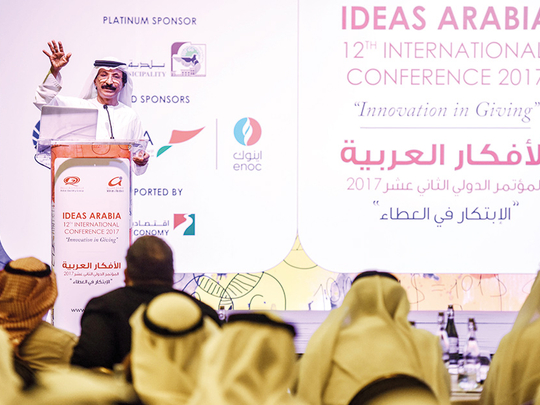
DUBAI: Thirty minutes into Sultan Ahmad Bin Sulayem’s supposedly 10-minute speech at Ideas Arabia, the master of ceremonies (MC) asked him to drew to a close.
It was another 20 minutes of ‘just one more thing’ before the DP World Group Chairman and CEO relinquished the podium to a wave of applause.
No one seemed to mind that he’d far exceeded the time slot for his opening address to Dubai Quality Group’s conference at the Four Seasons Resort, Jumeirah.
It was worth it.
If any attendee was under the impression that innovation was merely the latest buzzword, or the current Dubai fad, Bin Sulayem’s idiosyncratic overview of the emirate’s development, from the 1960s to the present, put them right. “Dubai came from nowhere with ideas,” he said at the start of his passionate and often amusing speech. “Whatever we’ve done in Dubai, whatever we’ve invested in Dubai, whenever we took calculated risks, it’s all about one thing: necessity is the mother of invention.
“In Dubai we had no means of surviving, We are not blessed with a lot of oil, we don’t have minerals, and we have inhabitants who survive based on what’s available.”
He echoed that theme towards the end of his speech, saying, “Growth is in our DNA. Ideas will make us survive. Ideas will make us rich.”
He filled the minutes between those statements with concrete examples, explaining how the key developments upon which modern Dubai is founded were creative responses to circumstances threatening Dubai’s growth.
Those examples included the dredging of the Creek, the building of Port Rashid and Jebel Ali Port, the development of the free zones, the founding of Emirates airline and the construction of the Palm, explaining how each of these were creative responses to circumstances of the day.
Along the way he gave a rare insight into the workings of Dubai at the highest level. “The easiest route is to say, ‘I can’t.’ That is something in Dubai that we cannot afford to say, because we cannot survive. What we do in Dubai, we don’t care about tall buildings and all that. It’s all about survival. Everything in Dubai is about ideas. Why do we have tall buildings? Because we have land. We have to go vertical. If we have to go horizontal, we cannot afford to build. Why do we have [man-made] islands? Because we have no beaches.”
His story of the building of the Palm began with Gulf Air’s request for preferential terms at Dubai Airport — a petition rejected by Dubai as it had an open skies policy. Gulf Air’s retaliation — cutting the number of flights to Dubai — inspired the foundation of Emirates as a regional airline, then an international one with flights to India.
The development of longer-range aircraft, imperilling Dubai’s location as a strategic stopover, led to the need to establish Dubai as a tourist destination, which meant it needed beaches.
Bin Sulayem said his first presentation for an island with 7km of beaches was rejected by His Highness Shaikh Mohammad Bin Rashid Al Maktoum, then Crown Prince of Dubai, now Vice-President and Prime Minister of the UAE and Ruler of Dubai, with his design ultimately resulting in the present Palm, adding 78km of coastline.
Bin Sulayem’s initial plan was to use desert sand to construct the Palm, but a trip with Shaikh Mohammad to see how a similar project in Ras Al Khaimah was faring convinced him dredging was the only option.
“I walked away from my car, and got carried away. It looked beautiful. But then I started sinking. The sand kept going down. Finally I couldn’t get out. I was up to my waist. I started calling everybody and nobody answered. And finally Shaikh Mohammad answered. If his phone was in his car, I wouldn’t be here with you today.”
“It was serious!” he insisted as the audience chuckled. The experience demonstrated Dubai would have to go with the more expensive option of dredging sea sand, prompting a further round of negotiations with potential contractors.
This rolling programme of development — of education and government in the 1970s, of trade in the 1980s, and tourism in the 1990s, of electronic and smart government in the 2000s, would not stop, he said.
“His Highness Shaikh Mohammad Bin Zayed Al Nahyan, Crown Prince of Abu Dhabi and Deputy Supreme Commander of the UAE Armed Forces, said we will have a big party celebrating the last oil tanker with the last shipment of oil from the UAE. We will celebrate it because we will have sustainable energy we can continue with. That’s the investment in Masdar, $10 billion invested in research about sustainable energy. So use your ideas.”
Conference MC Dr Soha Emam of the National Media Council, thanking Bin Sulayem, told him, “You’ve pretty much covered everything. We’re not going to have anything left for the two days.”










